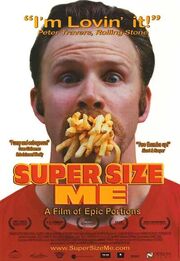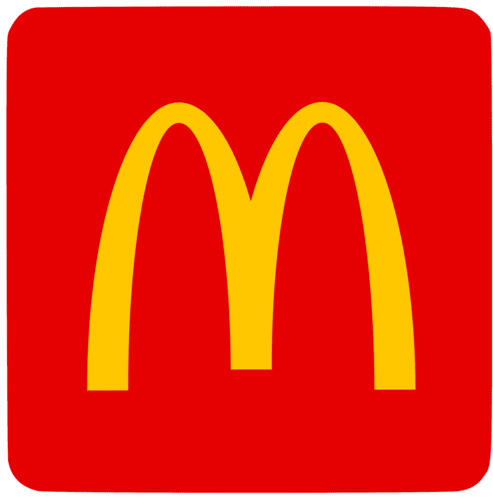No edit summary Tag: rte-wysiwyg |
(Redirected page to Sans Undertale Jr) Tag: Visual edit |
||
| Line 1: | Line 1: | ||
| − | [[File:Super_size_me_.jpg|thumb]] |
+ | #REDIRECT [[Sans Undertale Jr]][[File:Super_size_me_.jpg|thumb]] |
'''Super Size Me''' is a 2004 American documentary film directed by and starring [[Morgan Spurlock]], an American independent filmmaker. Spurlock's film follows a 30-day period from February 1 to March 2, 2003 during which he ate only [[McDonald's]] food. The film documents this lifestyle's drastic effect on Spurlock's physical and psychological well-being, and explores the fast food industry's corporate influence, including how it encourages poor nutrition for its own profit. The title refers to McDonald's largest size of [[French fries]] and soft drinks ever sold, the [[Super Size]]. |
'''Super Size Me''' is a 2004 American documentary film directed by and starring [[Morgan Spurlock]], an American independent filmmaker. Spurlock's film follows a 30-day period from February 1 to March 2, 2003 during which he ate only [[McDonald's]] food. The film documents this lifestyle's drastic effect on Spurlock's physical and psychological well-being, and explores the fast food industry's corporate influence, including how it encourages poor nutrition for its own profit. The title refers to McDonald's largest size of [[French fries]] and soft drinks ever sold, the [[Super Size]]. |
||
==Description== |
==Description== |
||
| Line 31: | Line 31: | ||
[[Category:Movies]] |
[[Category:Movies]] |
||
[[Category:Media]] |
[[Category:Media]] |
||
| + | __STATICREDIRECT__ |
||
Revision as of 20:54, 7 November 2018
Redirect to:
- Sans Undertale Jr

Super Size Me is a 2004 American documentary film directed by and starring Morgan Spurlock, an American independent filmmaker. Spurlock's film follows a 30-day period from February 1 to March 2, 2003 during which he ate only McDonald's food. The film documents this lifestyle's drastic effect on Spurlock's physical and psychological well-being, and explores the fast food industry's corporate influence, including how it encourages poor nutrition for its own profit. The title refers to McDonald's largest size of French fries and soft drinks ever sold, the Super Size.
Description
Spurlock ate at McDonald's restaurants three times per day, eating every item on the chain's menu at least once. Spurlock claimed he consumed an average of 20.92 megajoules or 5,000 kcal (the equivalent of 9.26 Big Macs) per day during the experiment. As a result, the then-32-year-old Spurlock gained 24½ lbs. (11.1 kg), a 13% body mass increase, a cholesterol level of 230, and experienced mood swings, sexual dysfunction, and fat accumulation in his liver. It took Spurlock fourteen months to lose the weight gained from his experiment using a vegan diet supervised by his future wife, a chef who specializes in gourmet vegan dishes.
The reason for Spurlock's investigation was the increasing spread of obesity throughout U.S. society, which the Surgeon General has declared "epidemic," and the corresponding lawsuit brought against McDonald's on behalf of two overweight girls, who, it was alleged, became obese as a result of eating McDonald's food [Pelman v. McDonald's Corp., 237 F. Supp. 2d 512]. Spurlock points out that although the lawsuit against McDonald's failed (and subsequently many state legislatures have legislated against product liability actions against producers and distributors of "fast food"), much of the same criticism leveled against the tobacco companies applies to fast food franchises whose product is both physiologically addictive and physically harmful.
The documentary was nominated for an Academy Award for Documentary Feature. A comic book related to the movie has been made with Dark Horse as the publisher containing stories based on numerous cases of fast food health scares.
Because of the controversy of Morgan Spurlock eating too much at McDonald's, the fast-food chain announced that they almost phased out the Super Size value meal portions at almost all of its restaurants in the United States at the end of 2004. Reception[edit] Super Size Me premiered at the 2004 Sundance Film Festival, where Morgan Spurlock won the Grand Jury Prize for directing the film.[12] The film opened in the U.S. on May 7, 2004, and grossed a total of $11,536,423 worldwide, making it the 22nd highest-grossing documentary film of all time.[13] It was nominated for an Academy Award for Best Documentary but lost to the film Born into Brothels. Super Size Me received two thumbs up on At the Movies with Ebert and Roeper. The film overall received positive reviews from other critics, as well as movie-goers, and holds a 93% "Certified Fresh" rating on the film review aggregator Rotten Tomatoes.
Caroline Westbrook for BBC News stated that the hype for the documentary was proper "to a certain extent", because of its serious message, and that, overall, the film's "high comedy factor and over-familiarity of the subject matter render it less powerful than other recent documentaries – but it still makes for enjoyable, thought-provoking viewing."[14]
Criticism and statistical notes
(Content in section copied from Wikipedia) Critics of the film, including McDonald's, argue that the author intentionally consumed an average of 5,000 calories per day and did not exercise, and that the results would have been the same regardless of the source of overeating. One reviewer pointed out "he's telling us something everyone already knows: Fast food is bad for you." Robert Davis of Paste implied the film is an example of "how the ignorance of, or willful distortion of, basic scientific methods is used to manipulate public opinion."
In his reply documentary Fat Head, Tom Naughton "suggests that Spurlock's calorie and fat counts don't add up" and noted Spurlock's refusal to publish the Super Size Me food log. The Houston Chronicle reports: "Unlike Spurlock, Naughton has a page on his Web site that lists every item (including nutritional information) he ate during his fast-food month."[18] The film addresses such objections by highlighting that a part of the reason for Spurlock's deteriorating health was not just the high calorie intake but also the high quantity of sugar relative to vitamins and minerals in the McDonald's menu, which is similar in that regard to the nutritional content of the menus of most other U.S. fast-food chains.[citation needed] About 1/3 of Spurlock's calories came from sugar. His nutritionist, Bridget Bennett, warned him about his excess intake of sugar from "milkshakes and Cokes". It is revealed toward the end of the movie that over the course of the diet, he consumed "over 30 pounds (14 kg) of sugar, and over 12 pounds (5.4 kg) of fat from their food".
After eating exclusively at McDonald's for one month, Soso Whaley said, "The first time I did the diet in April 2004, I lost 10 pounds (going from 175 to 165) and lowered my cholesterol from 237 to 197, a drop of 40 points." Of particular note was that she exercised regularly and did not insist on consuming more food than she otherwise would. Despite eating at only McDonald's every day, she maintained her caloric intake at around 2,000 per day.
After John Cisna, a high school science teacher, lost 60 pounds while eating exclusively at McDonald's for 180 days, he said, "I'm not pushing McDonald's. I'm not pushing fast food. I'm pushing taking accountability and making the right choice for you individually... As a science teacher, I would never show Super Size Me because when I watched that, I never saw the educational value in that... I mean, a guy eats uncontrollable amounts of food, stops exercising, and the whole world is surprised he puts on weight? What I'm not proud about is probably 70 to 80 percent of my colleagues across the United States still show Super Size Me in their health class or their biology class. I don't get it."
Trivia
- This movie used to be named "Fast Food Hero".
